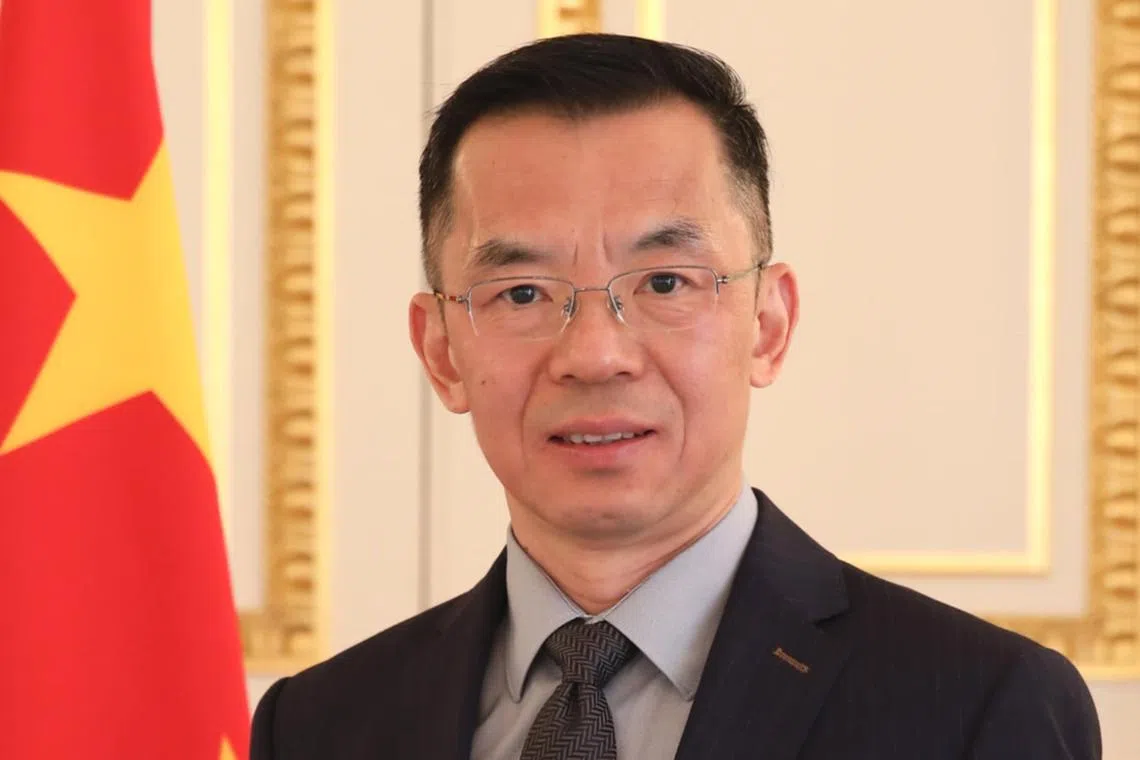Anger in Europe after Chinese diplomat Lu says ex-Soviet states are not sovereign
Sign up now: Get ST's newsletters delivered to your inbox

Chinese Ambassador to France Lu Shaye said in an interview that some “ex-Soviet Union countries” don’t have effective status under international law.
PHOTO: AMBASSADE DE CHINE EN FRANCE/FACEBOOK
Follow topic:
PARIS – European states have reacted with fury to remarks by China’s top envoy to France questioning the independence of former Soviet states, tainting the nation’s push to court leaders in the region and burnish its credentials to broker peace amid Russia’s invasion of Ukraine.
Ambassador Lu Shaye had said in an interview aired on Friday on French network LCI that some “ex-Soviet Union countries” don’t have effective status under international law.
“There is no international agreement to realise their status as a sovereign nation,” he said, after being questioned on whether he considers Crimea, a peninsula annexed by Russia in 2014, part of Ukraine.
But the comments quickly backfired, with Latvia, Lithuania and Estonia announcing plans to summon the top Chinese diplomats in their nations to explain the comments. All three are former members of the Soviet bloc, which collapsed in 1991.
Latvia’s Foreign Minister Edgars Rinkevics said in a tweet on Saturday that the coordinated move was in response to the “unacceptable statements” by Mr Lu.
Mr Margus Tsahkna, his counterpart in Estonia, called the comments “false and a misinterpretation of history”.
The diplomatic firestorm threatens to overshadow China’s attempts to portray itself as a peacemaker in Russia’s war in Ukraine
French President Emmanuel Macron, European Commission president Ursula von der Leyen and German Foreign Minister Annalena Baerbock have visited Beijing in recent weeks.
It also puts a question mark over Mr Macron’s initiative to work with China to establish a framework for negotiations between Russia and Ukraine, which Bloomberg News previously reported, citing people familiar with the plans.
France’s Foreign Ministry said it took note of Mr Lu’s comments “with consternation”, and reiterated the illegality of the Crimea annexation under international law, according to a report from Dow Jones, citing a ministry spokesman.
“We stress our full solidarity with all of our allies and partners concerned, who have gained their long-awaited independence after decades of oppression,” the report quoted the ministry as saying.
The Chinese embassy in France and China’s Ministry of Foreign Affairs did not immediately respond to queries from Bloomberg News sent outside normal operating hours.
Lithuania’s Foreign Minister Gabrielius Landsbergis cited Mr Lu’s comments in a tweet on Saturday to explain “why the Baltic States don’t trust China to broker peace in Ukraine”.
Taiwan, which is seeking European support as Beijing seeks to peel off its remaining diplomatic allies, voiced support for Lithuania’s position. Its Foreign Minister Joseph Wu responded to Mr Landsbergis’ tweet on Sunday, voicing solidarity with the Baltic states.
It is not the first time Mr Lu has stirred controversy with his remarks. The outspoken ambassador has in the past embraced his role as a “wolf warrior”,
Last year, he called for the Taiwanese people to be “re-educated” and blamed “foreign forces” for fuelling mass protests

